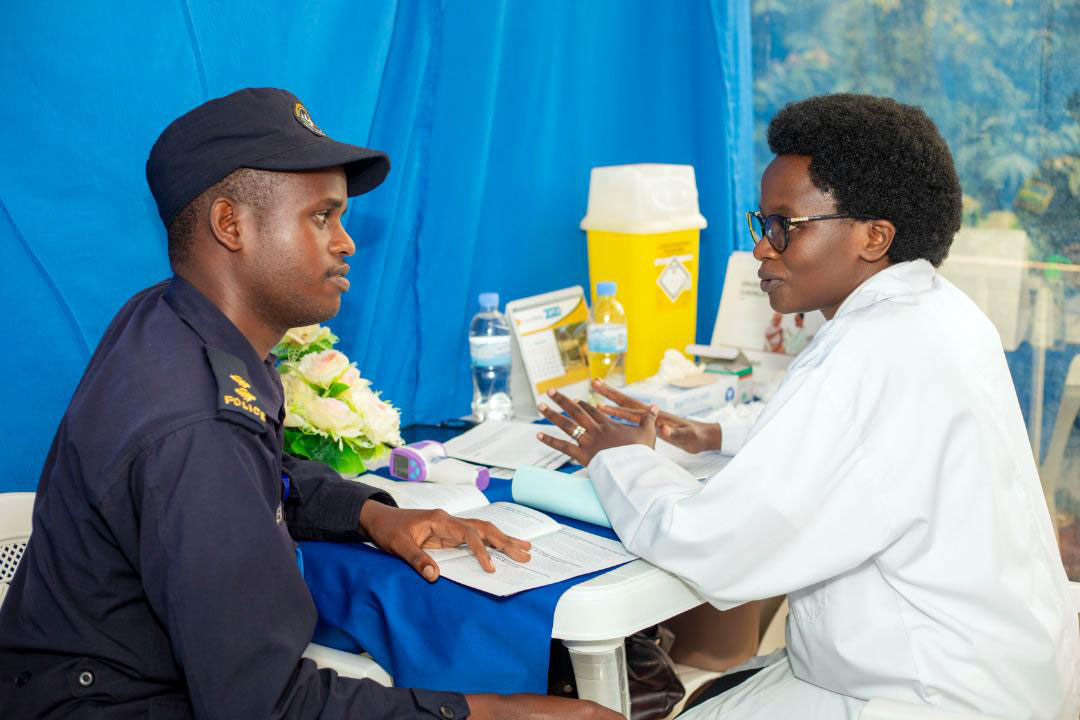Current Projects
INGABO: A Phase 3 Open-label Randomized Clinical Trial to Evaluate the Safety, Reactogenicity and Immunogenicity of a 2-dose Ebola Vaccine Regimen of Ad26.ZEBOV Followed by MVA-BN-Filo in Healthy Pregnant Women. This clinical trial will enroll 2000 pregnant women in Rwanda. The purpose of this study is: a) to assess adverse maternal/fetal outcomes in pregnant women randomized to receive the 2-dose Ebola vaccine regimen (Group A) and in unvaccinated pregnant women controls (Group B); and b) to assess adverse neonatal/infant outcomes in neonates/infants born to women randomized to Group A and in neonates/infants born to women randomized to Group B. This study is funded by Coalition for Epidemic Preparedness Innovations (CEPI), and sponsored by Janssen Vaccines & Prevention B.V. PI: Etienne Karita, Susan Allen.
Umurinzi Ebola Vaccination Campaign in Rwanda. Umurinzi is an implementation program to vaccinate 200,000 non-pregnant Rwandan adults and children near the Congolese border. This program is funded by Wellcome Trust and the UK Department for International Development, and sponsored by the Rwanda Ministry of Health. PI: Etienne Karita.
HIV Vaccine Preparedness and Clinical Trials in Rwanda and Zambia. Funded by the International AIDS Vaccine Initiative since 2003, activities include longitudinal studies of HIV-negative high risk women; clinical and laboratory studies of acute HIV infection in high risk women; research training, advanced degree support, and capacity building; and clinical site preparation for future HIV vaccine clinical trials. PI: Etienne Karita, William Kilembe, Mubiana Inambao, Susan Allen.
HVTN705 in Zambia. The primary purpose is to assess the efficacy, safety, and tolerability of a heterologous prime/boost regimen utilizing Ad26.Mos4.HIV and aluminum-phosphate adjuvanted Clade C gp 140 for the prevention of HIV infection in HIV-seronegative women residing in sub-Saharan Africa. This trial is funded by the HIV Vaccine Trials Network. PI: William Kilembe, Mubiana Inambao.
CoVPN 5001: A Prospective Study of Acute Immune Responses to SARS-CoV-2 Infection. The purpose of this study is to learn more about the acute response to infection with and recovery from severe acute respiratory syndrome coronavirus 2 (SARS-CoV-2). The information gained from the study can be used to help develop better tests for SARS-CoV-2 infection and COVID-19 disease and may help in developing future vaccines, other prevention strategies, and treatments. This study is funded by the HIV Vaccine Trials Network. PI: William Kilembe, Mubiana Inambao.
Natural History of SARS-CoV-2 in comparison in influenza A virus: a multi-site study focused in the Southern Hemisphere and equatorial regions. This study aims to document clinical outcomes and risk factors for severe disease in individuals with SARS-CoV-2 infection, define virologic features of SARS-CoV-2 infection, and define the magnitude, quality and longevity of immune responses to SARS-CoV-2. This study is funded by the National Institutes of Allergies and Infectious Disease Centers of Excellence for Influenza Research and Surveillance (CEIRS). PI: Walter Orienstein
Improving female genital schistosomiasis diagnosis within comprehensive reproductive health services in Zambia. The goal of this study is to develop and pilot test an innovative standardized diagnostic algorithm for female genital schistosomiasis and other common causes of genital ulcerative and inflammatory disease that is feasible to use in Zambian government clinics. This study is funded by the UK Department for International Development. PI: Kristin Wall
HPX2004 in Rwanda. Funded by Janssen Pharmaceuticals, this is a randomized, parallel-group, placebo-controlled, double-blind Phase 1/2a study in healthy HIV uninfected adults to assess the safety/tolerability and immunogenicity of 2 Different Prime/Boost Regimens: Priming With Trivalent Ad26.Mos.HIV and Boosting With Trivalent Ad26.Mos.HIV And Clade C Gp140 Plus Adjuvant, or Priming With Tetravalent Ad26.Mos4.HIV and Boosting With Tetravalent Ad26.Mos4.HIV and Clade C Gp140 Plus Adjuvant. PI: Susan Allen.
HPX2003 in Rwanda. Funded by Janssen Pharmaceuticals, this is a randomized, parallel-group, placebo-controlled, double-blind Phase 1/2a study in healthy HIV uninfected adults to assess the safety/tolerability and immunogenicity of 2 Different Prime/Boost Regimens: Priming With Tetravalent Ad26.Mos4.HIV and Boosting With Tetravalent Ad26.Mos4.HIV and Either Clade C gp140 Plus Adjuvant, Or a Combination of Mosaic and Clade C gp140 Plus Adjuvant. PI: Susan Allen.
Virologic Correlates of Heterosexual Transmission in Rwanda and Zambia. The major goals of this NIH-funded project are to determine whether sequence variants within gp120 are selected during transmission; if these variants reflect the population of virus present in the genital fluids of the donor transmitted and what the functional properties of viral variants are; and the virological, immunological and clinical consequences of superinfection. PI: Eric Hunter.
CTL and HIV Polymorphisms in Heterosexual Transmission in Rwanda and Zambia. The goal of this NIH-funded study is to understand the role of CTL escape in HIV transmission and disease pathogenesis. PI: Eric Hunter.
GREAT in Zambia. The Globally Relevant AIDS Vaccine Europe-Africa Trials Partnership is a collaboration between Oxford University, the International AIDS Vaccine Initiative, the Imperial College London, and research centers in three African countries (Zambia, Kenya, and Uganda). This collaboration will ensure the development of a cross-clade preventive HIV-1 vaccine strategy, by engaging at-risk populations from diverse clade regions, and by conducting a phase IIa clinical trial in these populations to assess the feasibility, safety, and immunogenicity of the tHIVconsvX. GREAT is funded through the European and Developing Countries Clinical Trials Partnership (EDCTP). PI: William Kilembe, Mubiana Inambao.
SANTHE in Rwanda and Zambia. The Sub-Saharan African Network for TB/HIV Research Excellence aims to strengthen South-South partnerships, create enabling environments for excellence in research in Africa, and train the next-generation leaders of African science. This consortium is specifically focused on HIV and TB as this ‘syndemic’ is a public health crisis in Africa that requires the full weight of basic science, translational/clinical research, and political and social mobilization. SANTHE is funded through Wellcome Trust. PI: Etienne Karita, William Kilembe, Mubiana Inambao.


